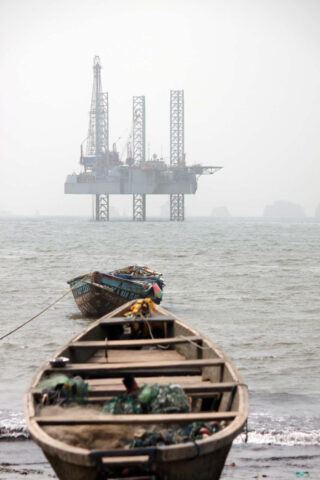The recent drop in the price of oil has at least temporarily changed the outlook for some resource-rich African nations that have been planning to develop their hydrocarbon reserves, according to analysts at a 10 March forum titled Sub-Saharan Africa: Energy Security and Growth.

Although the price collapse may be difficult for the extractive sector, it could push oil-producing countries to diversify their economies, they said at the forum held at the Woodrow Wilson International Center for Scholars in Washington, D. C. In addition, they argued for the need for transparency in extractive industry finances.
Previously, “the narrative of the story was the coming hydrocarbon boom in Africa,” said energy expert Phillip van Niekerk, managing director of Calabar Consulting, in Chevy Chase, Md. Proven hydrocarbon reserves on the continent have more than doubled over the past 30 years. Oil and gas development activity had expanded beyond a few major oil-producing countries and companies, with new discoveries and exploration “being pushed out to the frontiers” to Somalia, Mauritania, and other areas, he said.
“A year ago, we were talking about the governance challenges and how Africa is going to meet this and how are they going to ensure that this bounty is going to be translated into real benefits for the people of Africa. The story now obviously has changed somewhat” with the drop in oil prices, he noted.
Van Niekerk said that a number of offshore exploration projects are being put on hold, along with some technologically challenging and expensive exploration projects in much of western Africa. However, Nigeria and a few other countries with “world-class” assets likely will keep up production, he added.
The downturn “is particularly cruel to a lot of the African countries who were thinking that they might in a relatively short space of time become oil and gas producers.”
The Downturn as a Wake-Up Call
The downturn “is particularly cruel to a lot of the African countries who were thinking that they might in a relatively short space of time become oil and gas producers,” Van Niekerk said. The new outlook is a “wake-up call” for countries to find ways to support their economy outside of the extractive sector, he added.
Falling oil prices may force countries to deal with their “resource curse,” the phenomenon where countries rely “on massive revenue to fall down from heaven and deliver” riches, Van Niekerk explained. For now, however, “that’s not going to happen. If anything, this reality check has been positive in that sense.”
Van Niekerk also added a word of caution about conflicts within various countries, including Nigeria: Even if oil is not the driver of a conflict, it is a complicating factor. “The lesson from Nigeria is you’ve got to construct a framework in which the distribution of the revenues from the oil is seen to be fair, in which everybody participates, which is transparent,” he said.
The Need for Transparency
Charles McPherson, an international consultant on petroleum and minerals policies and taxation, stressed the need for transparency in resource-rich countries. McPherson, who is an honorary lecturer and member of the global faculty and external consultants team at the University of Dundee’s Centre for Energy, Petroleum and Mineral Law and Policy in Scotland, cited this need particularly in relation to payment and revenue flows, licensing, contracts, and revenue management.
He said there is also a need for transparency related to the finances of many national oil companies. “Watch them, put the transparency light on them. This is the potential Achilles heel in the whole transparency story,” he said.
McPherson, a former senior adviser at the World Bank and the International Monetary Fund, said that most of the major oil-producing countries in Africa are members of the Extractive Industries Transparency Initiative, which helps with financial accountability. Despite the good progress with countries signing on to the initiative, McPherson said he is concerned about whether the outcomes that are expected with transparency will actually include less corruption and beneficial developmental impact within countries.
Long-Term Trends
David Goldwyn, a former special envoy and international energy coordinator at the U.S. Department of State, said that there may not be very much new oil and gas exploration in Africa this year but that work on large reserves likely will go forward but probably at a slower place. He said that many companies take a long-term view of development and pricing.
Goldwyn, now the president of Goldwyn Global Strategies LLC, added that “the potential for Africa to reduce its climate burden and to skip generations of technology and electricity are really quite robust.” Countries “have learned an awful lot about how to do resource development right,” but the question is whether the outcomes will be different, more transparent, and more beneficial to society as a whole than they were in the past, he said.
“How does a company show value to the entire country where it invests?”
Goldwyn noted several challenges for African oil and gas resource development. With the downturn in the price of oil, many projects are chasing a smaller number of dollars, and successful projects need to show competitive rates of return and overcome concerns about security and lack of infrastructure.
Another challenge he pointed to is the need for shared value. “How does a company show value to the entire country where it invests, and how do you provide value so every succeeding administration doesn’t extract maximum rent from the project, threatening to kill the project?”
He called for the U.S. government to channel more assistance into capacity building within countries, to support investment in hydrocarbon-connected endeavors such as the fertilizer industry, and to have the Department of Commerce conduct more commercial diplomacy.
—Randy Showstack, Staff Writer
Citation: Showstack, R. (2015), Analysts examine energy security in sub-Saharan Africa, Eos, 96, doi:10.1029/2015EO026273. Published on 13 March 2015.
Text © 2015. The authors. CC BY-NC 3.0
Except where otherwise noted, images are subject to copyright. Any reuse without express permission from the copyright owner is prohibited.

